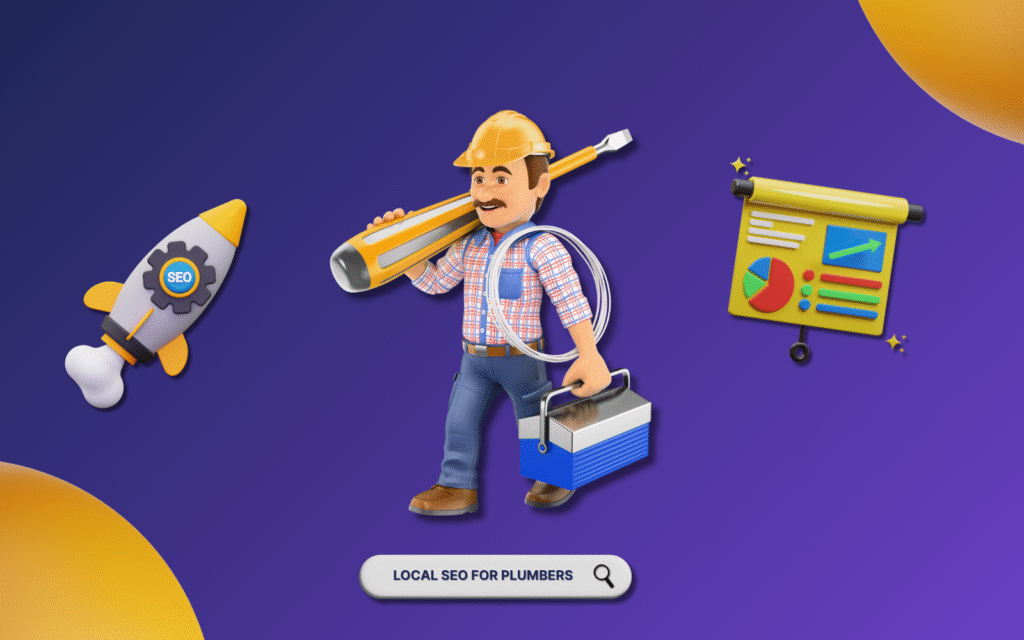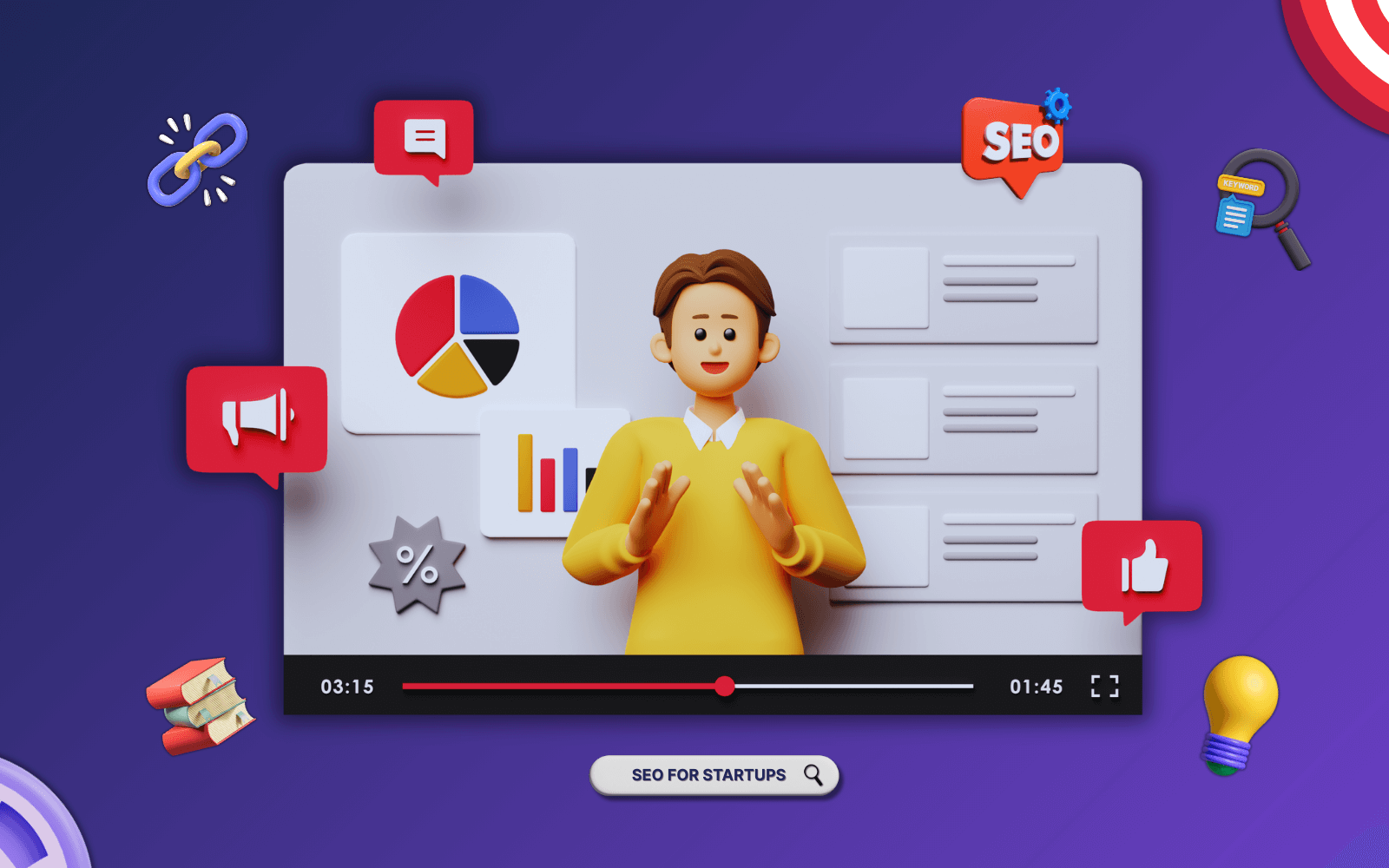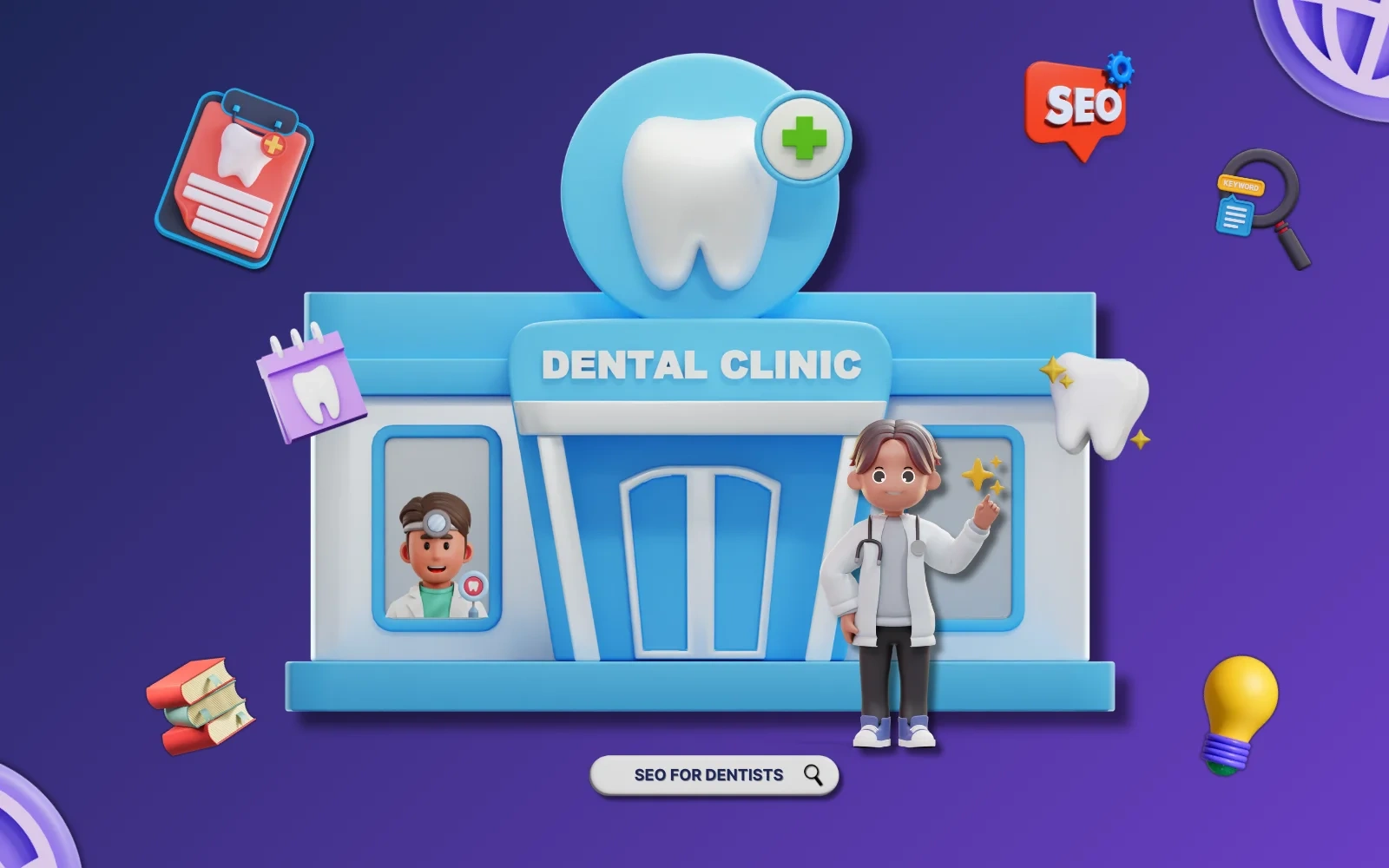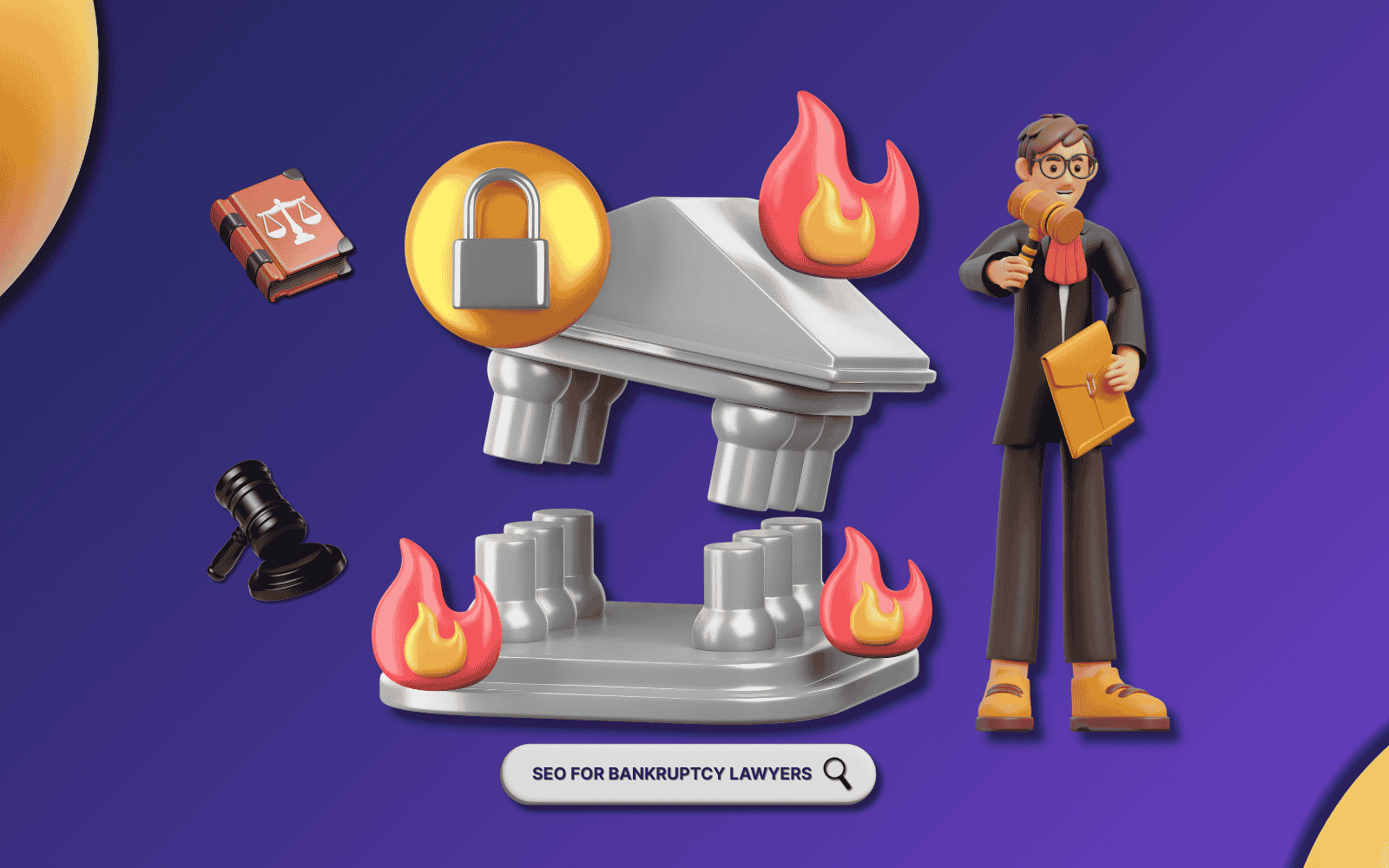What This Article Will Do For Your Business
This guide addresses the biggest frustration plumbing business owners face: watching competitors with fewer reviews and less experience steal your customers. You’ll discover exactly why your current marketing isn’t working and learn the specific steps that turn your website into a lead-generating machine. We’ll show you how to outrank bigger companies, get more emergency calls, and stop wasting money on marketing that doesn’t work.
The Problem Every Plumber Faces Right Now
You’re probably dealing with at least one of these issues:
- Customers call your competitors instead of you, even though you do better work
- Your phone stops ringing during slow seasons
- You have more Google reviews than your competition but they still show up first
- You spend money on advertising but can’t track which leads actually come from it
- Customers choose plumbers based on price because they can’t tell you apart from everyone else
Here’s the truth: local SEO for plumbers isn’t just about having a website. It’s about making sure customers find YOU when their toilet overflows at 2 AM or their water heater breaks on Sunday morning.
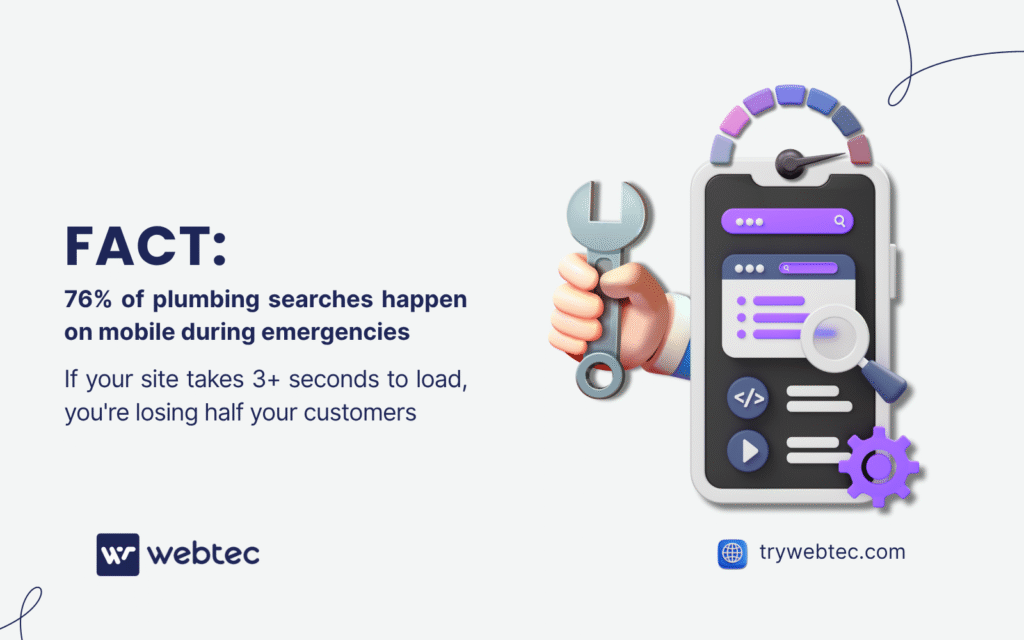
Why Your Current Marketing Probably Isn’t Working
Most plumbers make the same mistakes with their online presence:
| What You’re Probably Doing | Why It Doesn’t Work | What Actually Works |
| Posting about “how to fix pipes” on your blog | DIY customers don’t hire plumbers | Target emergency searches like “plumber near me” |
| Asking every customer for reviews | Google penalizes obvious review farming | Build reviews naturally through great service |
| Copying what big franchise companies do | You can’t compete on their scale | Focus on local community connections |
| Trying to rank for general terms like “plumbing” | Too much competition nationwide | Target specific local terms like “emergency plumber [your city]” |
The biggest mistake? Thinking local SEO is the same as regular SEO. It’s not.
How Local SEO Actually Works for Your Plumbing Business
When someone’s basement floods, they don’t browse through plumbing websites for an hour. They grab their phone and search “emergency plumber near me.” Google shows them three options in the map results (called the local pack) plus some website listings below.
Your goal: appear in those top three map results.
Google decides who shows up based on three main factors:
Relevance: Does your business match what they’re searching for? Distance: How close are you to the customer? Prominence: How well-known and trusted is your business online?
Here’s what’s interesting: distance often beats everything else. A plumber 2 miles away with 50 reviews will often outrank one 15 miles away with 500 reviews.
The Real Reason Competitors With Fewer Reviews Beat You
This drives plumbers crazy. You’ve worked hard to build 1,000+ Google reviews, but some guy with 30 reviews keeps showing up above you. Here’s why:
| Factor | How Much It Matters | What This Means for You |
| Number of Reviews | Medium | Having some reviews matters, but more isn’t always better |
| Review Quality & Recency | High | Recent reviews from real customers matter more than old ones |
| Distance from Customer | Very High | Being closer to the searcher often trumps everything else |
| Website Quality | High | A fast, mobile-friendly site can beat poor sites with more reviews |
| Business Category Selection | Very High | Choosing “Plumber” instead of “Contractor” makes a huge difference |
| Citation Consistency | High | Having the same business info everywhere online |
The solution isn’t getting more reviews (though they help). It’s optimizing all these factors together.
Your Google Business Profile: The Foundation of Everything
Your Google Business Profile is like your storefront window. Most customers will see it before they visit your website. Here’s what you need to get right:
The Basics That Most Plumbers Get Wrong
Complete Every Single Field Don’t leave anything blank. Google rewards complete profiles. Include:
- Exact business hours (including emergency availability)
- All phone numbers (office, mobile, emergency line)
- Your service area (be specific about which cities/neighborhoods)
- Business description that mentions you’re a licensed plumber
- Website URL that actually works
Choose the Right Business Category This is huge. Pick “Plumber” as your primary category, not “Contractor” or “Home Improvement.” You can add secondary categories like “Water Heater Service” or “Drain Cleaning Service” but your main category should be specific.
Upload Quality Photos Weekly Google loves fresh content. Add new photos every week:
- Your work truck with company logo
- Before/after shots of recent jobs (with customer permission)
- Your team in uniform
- Tools and equipment
- Happy customers (with permission)
The Google Posts Strategy That Gets You More Calls
Most plumbers either don’t post at all or post random stuff. Here’s what actually works:
| Type of Post | When to Post | What to Include |
| Emergency Availability | During storms, holidays, extreme weather | “Available 24/7 for emergency calls” with your phone number |
| Seasonal Reminders | Before winter, summer, extreme weather | “Prevent frozen pipes” tips with clear call-to-action |
| Recent Job Photos | After completing interesting projects | Before/after photos with brief description |
| Community Involvement | When you sponsor local events or help community | Photos of your involvement with local context |
Post 2-3 times per week. Consistency beats frequency.
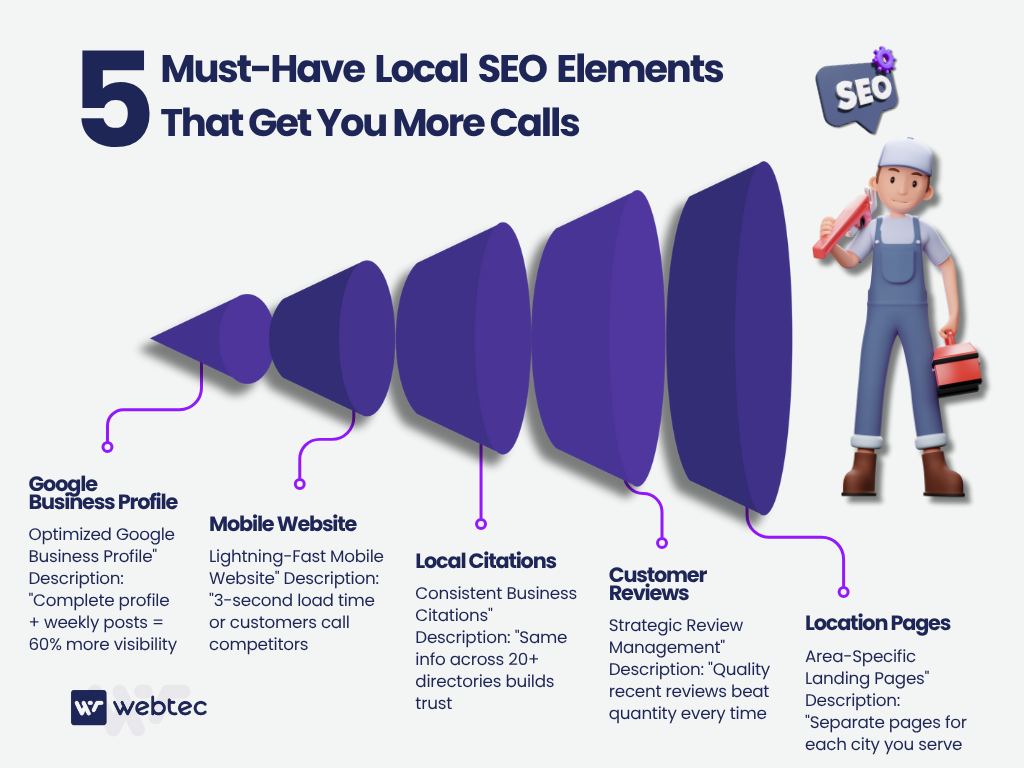
The Website Elements That Actually Generate Plumbing Leads
Your website has one job: turn visitors into phone calls. Most plumbing websites fail because they try to educate instead of convert.
Page Structure That Works
Homepage
- Your phone number in the top right corner (make it huge on mobile)
- “Emergency Plumber in [Your City]” as your main headline
- Service area map showing exactly where you work
- Customer reviews/testimonials
- Clear services list with prices when possible
Service Pages Create separate pages for each major service:
- Emergency plumbing repair
- Water heater installation/repair
- Drain cleaning
- Bathroom remodeling
- Kitchen plumbing
Each page should target the specific search terms customers use.
The Mobile Problem That’s Costing You Calls
Here’s a fact that will shock you: 76% of plumbing searches happen on mobile phones, usually during emergencies. If your website takes more than 3 seconds to load on mobile, you’re losing half your potential customers.
Mobile Optimization Checklist:
| Element | Why It Matters | How to Fix It |
| Phone Number Placement | Emergency customers need to call immediately | Put clickable phone number at top of every page |
| Loading Speed | Slow sites lose emergency customers | Compress images, use fast hosting |
| Easy Navigation | Customers won’t hunt for your contact info | Simplify menus, make contact info obvious |
| Readable Text | Small text frustrates mobile users | Use large fonts, short paragraphs |
The Review Strategy That Actually Works (Legally)
Getting reviews is important, but there’s a right way and a wrong way to do it.
What NOT to Do (Google Will Penalize You)
- Buy fake reviews
- Offer discounts for reviews
- Ask for reviews before the job is complete
- Post reviews for yourself
- Ask employees/family to post reviews
What Actually Works
The Follow-Up System:
- Complete the job professionally
- Wait 2-3 days
- Send a text or email thanking them for their business
- Mention that reviews help your small local business
- Provide a direct link to your Google Business Profile
- Don’t pressure or follow up multiple times
Sample Text Message: “Hi [Name], thanks for choosing [Business Name] for your plumbing repair. If you were happy with our service, a quick Google review would really help our small local business. Here’s the link: [direct link]. Thanks again!”
How to Handle Bad Reviews
Bad reviews happen. Here’s how to minimize the damage:
Respond Within 24 Hours
- Thank them for the feedback
- Acknowledge their concern
- Explain what you’ll do to fix it
- Provide your phone number for private discussion
- Stay professional (other customers are watching)
Example Response: “Thank you for your feedback. I apologize that we didn’t meet your expectations. I’d like to discuss this with you directly to make things right. Please call me at [phone] so we can resolve this issue.”
Technical Stuff Your Website Needs (Made Simple)
Most plumbers get overwhelmed by technical SEO talk. Here’s what actually matters for your business:
Schema Markup (Structured Data)
Think of this as a way to tell Google exactly what your business does. It’s code that goes on your website that helps you show up better in search results.
What You Need:
- Local Business Schema (tells Google you’re a local plumber)
- Service Schema (lists all your plumbing services)
- Review Schema (shows your star rating in search results)
Don’t try to do this yourself. Hire someone who knows what they’re doing or work with an agency that specializes in plumber SEO.
Citations and Directory Listings
Citations are mentions of your business name, address, and phone number on other websites. Google uses these to verify that you’re a real business operating in your area.
Priority Directories for Plumbers:
| Directory | Why It Matters | Cost |
| Google Business Profile | Most important for local search | Free |
| Yelp | High consumer trust | Free basic listing |
| Better Business Bureau | Builds credibility | Paid membership |
| Angie’s List/HomeAdvisor | Where customers look for contractors | Paid leads |
| Local Chamber of Commerce | Shows community involvement | Membership fee |
The Rule: Your business name, address, and phone number must be EXACTLY the same everywhere online. If you use “ABC Plumbing LLC” on Google, use it everywhere else too.
Location Pages That Get You Found
If you serve multiple cities or neighborhoods, create separate pages for each area. This is crucial for local SEO for plumbers because it helps you show up when people search “[service] in [specific area].”
How to Structure Location Pages
Page Title: “Emergency Plumber in [City Name] | [Your Business Name]”
Content Structure:
- Opening paragraph mentioning the city/neighborhood name
- List of services you provide in that area
- Local landmarks or neighborhood references
- Customer testimonials from that area
- Service area map
- Local phone number (if you have one)
Example for a page targeting downtown: “When you need an emergency plumber in downtown [City], [Business Name] provides fast, reliable service 24/7. We’ve been serving the downtown area for [X] years, from the historic district near [Local Landmark] to the business district around [Local Street].”
The Social Media Strategy That Actually Helps Your SEO
Social media won’t directly make you rank higher, but it can help your local SEO in these ways:
Facebook:
- Post photos of recent jobs
- Share customer success stories
- Join local community groups and offer helpful advice (don’t sell)
- Respond to messages quickly
Instagram:
- Before/after photos perform well
- Use local hashtags (#[YourCity]plumber)
- Tag your location on posts
- Story highlights for different services
Key Point: Don’t try to be on every platform. Pick one or two and do them well.
Tracking What Actually Matters
Most plumbers track the wrong metrics. Website traffic doesn’t pay your bills – phone calls do.
Metrics That Matter for Your Business
| Metric | Why It Matters | How to Track It |
| Phone Calls from Website | Direct revenue indicator | Call tracking numbers |
| Local Pack Rankings | Visibility in map results | Manual searches or tools like BrightLocal |
| Google Business Profile Views | How many people see your listing | Google Business Profile insights |
| Form Submissions | Potential leads | Google Analytics goals |
| Review Growth Rate | Reputation building | Monthly review count |
The Simple Monthly Report Card
Track these numbers monthly:
- Total phone calls from online sources
- New Google reviews received
- Local pack rankings for your top 5 search terms
- Website visitors from your local area
If these numbers go up, your SEO is working.
What’s Coming in 2025 (And How It Affects Plumbers)
AI Search Results
Google now shows AI-generated answers at the top of many searches. For plumbers, this means:
What to Do:
- Create FAQ sections on your website
- Answer common questions directly and clearly
- Include specific local information in your answers
Example FAQ: “Q: How quickly can you respond to emergency plumbing calls in [Your City]? A: We typically arrive within 30-45 minutes for emergency calls in [Your City] and surrounding areas. We’re available 24/7, including weekends and holidays.”
Voice Search Growth
More people are using voice search, especially for local services.
How People Search by Voice:
- “Hey Google, find an emergency plumber near me”
- “What’s the number for a plumber in [neighborhood]?”
- “Who’s the best plumber in [city]?”
Optimize for These Searches:
- Include conversational phrases in your content
- Answer questions the way people actually ask them
- Focus on local landmarks and neighborhood names
Local Marketing That Supports Your SEO
Community Involvement That Actually Helps
High-Impact, Low-Cost Ideas:
- Sponsor a local Little League team (your logo on uniforms)
- Offer free plumbing inspections at community events
- Partner with local real estate agents
- Join your local chamber of commerce
- Volunteer for community service projects
Each of these activities can result in local website links, mentions, and word-of-mouth referrals that support your online presence.
Networking That Builds Your Online Presence
Strategic Partnerships:
- Real estate agents (they need trusted plumber referrals)
- HVAC companies (complementary services)
- General contractors (subcontracting opportunities)
- Property managers (ongoing service contracts)
Ask partners to link to your website from theirs. Local links from relevant businesses help your SEO.
Common Mistakes That Kill Your Results
Mistake #1: Trying to Rank for Everything
Wrong: Targeting “plumbing services” nationally Right: Targeting “emergency plumber in [your city]”
Mistake #2: Neglecting Your Google Business Profile
Wrong: Setting it up once and forgetting about it Right: Weekly posts, photo updates, review responses
Mistake #3: Focusing Only on Reviews
Wrong: Asking every customer for reviews, buying fake ones Right: Providing great service and asking naturally
Mistake #4: Copying Big Companies
Wrong: Trying to compete with national chains on their terms Right: Emphasizing local knowledge and personal service
Mistake #5: Not Tracking Results
Wrong: Hoping your marketing is working Right: Measuring phone calls, leads, and rankings monthly
Your 90-Day Action Plan
Month 1: Foundation
Week 1:
- Claim and optimize your Google Business Profile
- Ensure your website loads quickly on mobile
- Set up call tracking to measure phone calls
Week 2:
- Create or update your main service pages
- Add schema markup to your website
- Take and upload 20+ photos to Google Business Profile
Week 3:
- Submit your business to top 10 local directories
- Start posting weekly on Google Business Profile
- Set up Google Analytics and Google Search Console
Week 4:
- Create location-specific pages if you serve multiple areas
- Start asking satisfied customers for reviews (the right way)
- Join local business groups on social media
Month 2: Content and Optimization
Week 5-6:
- Write FAQ sections for your website
- Optimize all pages for mobile users
- Create emergency service landing page
Week 7-8:
- Build citations in local directories
- Start collecting customer testimonials
- Optimize website speed and performance
Month 3: Growth and Tracking
Week 9-10:
- Launch social media posting schedule
- Partner with complementary local businesses
- Monitor and respond to all online reviews
Week 11-12:
- Analyze first quarter results
- Adjust strategy based on what’s working
- Plan content calendar for next quarter
Working With Professionals vs. DIY
What You Can Do Yourself
- Google Business Profile optimization
- Weekly posting and photo uploads
- Basic citation building
- Social media management
- Customer review follow-up
What You Should Hire Out
- Schema markup implementation
- Technical website optimization
- Advanced citation building
- Competitive analysis and strategy
- Monthly reporting and adjustments
The truth is, local SEO for plumbers requires ongoing attention and technical knowledge that most business owners don’t have time to develop. You’re better at fixing pipes than optimizing websites – that’s normal.
Webtec specializes in SEO for plumbing businesses across Canada, the US, and the UK. We handle the technical stuff so you can focus on providing great plumbing service to your customers.
Industry Applications Beyond Plumbing
The strategies in this guide work for other skilled trades too. SEO for electricians and local SEO for electricians follow similar principles, targeting emergency electrical repairs and local service calls.
Professional services benefit from these approaches as well. SEO for accountants adapts these local optimization techniques for tax season and business consulting searches.
Healthcare practices can apply these methods with some modifications. SEO for dental practices, SEO for cosmetic dentists, SEO for orthodontists, and local SEO for orthodontists all benefit from local pack optimization and reputation management.
Even online businesses need local strategies sometimes. SEO for ecommerce and SEO for fashion ecommerce companies often target specific geographic markets, while SEO for saas businesses may focus on particular regions or cities for their marketing efforts.
Measuring Success: Your Monthly SEO Health Check
Quick 10-Minute Monthly Review
Google Business Profile Check:
- How many people viewed your profile this month?
- How many clicked to call or visit your website?
- What search terms are people using to find you?
Phone Call Tracking:
- How many calls came from online sources?
- Which pages on your website generate the most calls?
- What’s your call-to-customer conversion rate?
Local Rankings:
- Search for “plumber near me” from different locations you serve
- Check where you appear for “emergency plumber [your city]”
- Monitor your position in the local pack results
Review Growth:
- How many new reviews did you get this month?
- What’s your overall star rating?
- Have you responded to all reviews?
Red Flags That Need Immediate Attention
Your Rankings Dropped Suddenly:
- Check if your Google Business Profile was suspended
- Verify your website is still working properly
- Look for new negative reviews that need responses
Phone Calls Are Down:
- Check if your phone number displays correctly on mobile
- Test that your website loads quickly
- Verify your business hours are current
Competitor Beat You:
- Analyze what they’re doing differently
- Check if they have more recent reviews
- See if they’re posting more frequently than you
Frequently Asked Questions
How long does local SEO take to work for plumbers? Most plumbing businesses see improvements within 3-6 months, but significant results typically take 6-12 months. Emergency services can see faster results because there’s less competition for urgent searches.
Should I hire an SEO company or do it myself? Handle the basics yourself (Google Business Profile, posting, customer service), but hire professionals for technical work like schema markup and website optimization. Your time is better spent on plumbing work than learning SEO.
How much should I spend on local SEO? Plan to invest $1,000-3,000 monthly for professional SEO services, or dedicate 10-15 hours per week if doing it yourself. Compare this to what you spend on truck lettering or Yellow Pages ads.
Why does my competitor with fewer reviews rank higher? Google considers distance, website quality, and business category selection more heavily than review count. A closer plumber with a better website often beats one farther away with more reviews.
Do I need separate pages for each city I serve? Yes, if you serve multiple distinct cities. Create unique content for each area rather than duplicate pages. Include local landmarks and neighborhood references to add value.
How often should I post on Google Business Profile? Post 2-3 times per week consistently rather than daily for a few weeks then stopping. Google rewards consistent activity over sporadic bursts.
Key Takeaways for Your Plumbing Business
Local SEO for plumbers requires a different approach than traditional marketing. Focus on emergency searches, mobile optimization, and local community connections rather than broad educational content.
Your Google Business Profile serves as your most important marketing tool. Complete optimization, regular posting, and professional review management directly impact how many customers find and choose your business.
Technical website elements like mobile speed, schema markup, and proper page structure often determine whether you outrank competitors, regardless of review differences.
Success comes from consistent execution of basics rather than complex strategies. Weekly posting, monthly citation building, and prompt review responses generate better results than sporadic advanced tactics.
The 2025 SEO landscape favors businesses that answer customer questions directly and maintain strong local community presence both online and offline.
Professional local SEO for plumbers combines technical expertise with industry knowledge to navigate the complex ranking factors that determine local search success. The investment typically pays for itself through increased emergency calls and higher-value service contracts.

